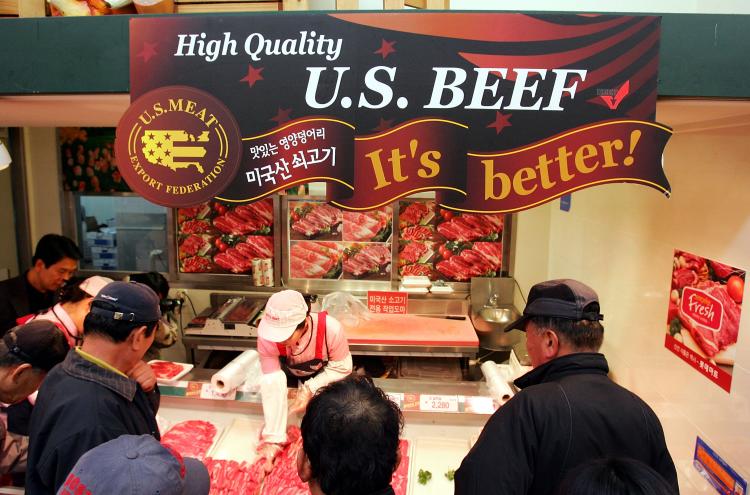OTTAWA—After more than six years of unsuccessful efforts to urge South Korea to lift its import ban on Canadian beef, Canada’s request last week for a World Trade Organization (WTO) panel to settle the dispute raises suggestions that a bilateral agreement may still be possible.
The Korea International Trade Association (KITA), the country’s largest business association, released a report on Monday recommending that the two countries reach an agreement without the WTO panel.
The report concluded that the WTO would likely rule in Canada’s favour and require Korea to meet its international trade obligations by removing the Canadian beef embargo.
“This Canadian step regarding WTO arbitration may result in a last-minute agreement if the ROK (Republic of Korea) feels not sure it can win at the WTO,” said Jacob Kovalio, professor of Asian affairs at Ottawa’s Carleton University.
The KITA report said Korea’s Canadian beef embargo violates World Organisation for Animal Health (OIE) regulations because the WTO-recognized standard-setting body classifies Canada as a “controlled BSE risk” country, meaning it complies with the recommended safeguards and its beef and cattle can be safely traded.
Canada asked for creation of the WTO dispute settlement panel after years of technical negotiations and political intervention that failed to make progress, including a visit to Seoul by Agriculture Minister Gerry Ritz in March and WTO consultations with South Korea in May.
South Korea banned Canadian beef imports in 2003 over public health concerns after bovine spongiform encephalopathy (BSE), or mad cow disease, was found in an Alberta cow. That same year it imposed a ban on U.S. beef after a case of BSE was found in the U.S.
The OIE classified both Canada and the U.S. as having “controlled risk” status for BSE in May 2007.
Korea lifted the ban on U.S. beef a year later, agreeing to allow beef imports from cattle under 30 months old, which are believed to be less at risk for BSE, and then to raise the age limit once public confidence over safety of the meat improves.
However, Seoul continued to ban beef imports from Canada.
Don Baker, a professor in the University of British Columbia’s Asian studies department, noted protectionism and nationalism as key reasons for the ban, along with the U.S. being a much more important international partner.
In fact, Seoul’s initial agreement to lift the ban on U.S. beef met with mass public demonstrations by tens of thousands—which sometimes turned violent—from May to early July 2008. Many Koreans were angered that their government had conceded too much and was even willing to endanger public health in order to push forward a free trade agreement with the U.S.
However, some observers have noted that there had been over exaggeration of the danger of BSE by some South Korean media.
John Masswohl, director of government and international relations with the Canadian Cattlemen’s Association (CCA), agreed that protectionism was behind the ban and said that Canada has even stronger controls than the U.S.
Canada implemented an enhanced BSE-related feed ban in July 2007, as recommended by the OIE to both Canada and the U.S. in 2003, while the U.S. will not be implementing the same ban until October this year, he said.
In infected cattle, BSE is concentrated in certain tissue called “specified risk material,” or SRM, such as the brain and spinal cord. To ensure that beef is safe for humans, Canada prohibits these materials from going into the human food system, said Mr. Masswohl.
The feed ban, on the other hand, is to prevent BSE spread among cattle. It is known that BSE is spread when cattle consume feed contaminated with proteins from infected animals. To address this risk, in 1997 Canada banned most proteins, including SRM, from cattle feed. The enhanced feed ban in 2007 extended the SRM ban to all animal feeds, pet foods, and fertilizers.
“From a scientific point of view, I would very confidently make the argument that our beef is just as safe if not safer than U.S. beef, but they’re using different excuses to keep us out and basically we’ve had enough of that,” Mr. Masswohl said.
The KITA report also noted that, by allowing U.S. beef imports while banning Canadian beef, South Korea is violating the equality principle of the General Agreement on Tariffs and Trade, since both are “controlled BSE risk” countries.
Prior to the ban, South Korea was Canada’s fourth-largest beef export market, valued at $50 million in 2002.
Of Canada’s top ten beef export markets before 2003, only South Korea and China are not allowing any access, said Mr. Masswohl.
Meanwhile, access is “pretty much back to normal with the U.S.,” Canada’s largest export market, worth $2.5 billion annually. And Canada is working toward restoring full access to other countries such as Japan and Mexico through multiple phases, he said.
The CCA estimates that, collectively, the access Canada is still trying to get to all the markets amounts to about $100 per animal. As Canada typically markets about 4 to 4.5 million calves per year, that adds up to half a billion dollars per year.
The Korea International Trade Association (KITA), the country’s largest business association, released a report on Monday recommending that the two countries reach an agreement without the WTO panel.
The report concluded that the WTO would likely rule in Canada’s favour and require Korea to meet its international trade obligations by removing the Canadian beef embargo.
“This Canadian step regarding WTO arbitration may result in a last-minute agreement if the ROK (Republic of Korea) feels not sure it can win at the WTO,” said Jacob Kovalio, professor of Asian affairs at Ottawa’s Carleton University.
The KITA report said Korea’s Canadian beef embargo violates World Organisation for Animal Health (OIE) regulations because the WTO-recognized standard-setting body classifies Canada as a “controlled BSE risk” country, meaning it complies with the recommended safeguards and its beef and cattle can be safely traded.
Canada asked for creation of the WTO dispute settlement panel after years of technical negotiations and political intervention that failed to make progress, including a visit to Seoul by Agriculture Minister Gerry Ritz in March and WTO consultations with South Korea in May.
South Korea banned Canadian beef imports in 2003 over public health concerns after bovine spongiform encephalopathy (BSE), or mad cow disease, was found in an Alberta cow. That same year it imposed a ban on U.S. beef after a case of BSE was found in the U.S.
The OIE classified both Canada and the U.S. as having “controlled risk” status for BSE in May 2007.
Korea lifted the ban on U.S. beef a year later, agreeing to allow beef imports from cattle under 30 months old, which are believed to be less at risk for BSE, and then to raise the age limit once public confidence over safety of the meat improves.
However, Seoul continued to ban beef imports from Canada.
Don Baker, a professor in the University of British Columbia’s Asian studies department, noted protectionism and nationalism as key reasons for the ban, along with the U.S. being a much more important international partner.
In fact, Seoul’s initial agreement to lift the ban on U.S. beef met with mass public demonstrations by tens of thousands—which sometimes turned violent—from May to early July 2008. Many Koreans were angered that their government had conceded too much and was even willing to endanger public health in order to push forward a free trade agreement with the U.S.
However, some observers have noted that there had been over exaggeration of the danger of BSE by some South Korean media.
John Masswohl, director of government and international relations with the Canadian Cattlemen’s Association (CCA), agreed that protectionism was behind the ban and said that Canada has even stronger controls than the U.S.
Canada implemented an enhanced BSE-related feed ban in July 2007, as recommended by the OIE to both Canada and the U.S. in 2003, while the U.S. will not be implementing the same ban until October this year, he said.
In infected cattle, BSE is concentrated in certain tissue called “specified risk material,” or SRM, such as the brain and spinal cord. To ensure that beef is safe for humans, Canada prohibits these materials from going into the human food system, said Mr. Masswohl.
The feed ban, on the other hand, is to prevent BSE spread among cattle. It is known that BSE is spread when cattle consume feed contaminated with proteins from infected animals. To address this risk, in 1997 Canada banned most proteins, including SRM, from cattle feed. The enhanced feed ban in 2007 extended the SRM ban to all animal feeds, pet foods, and fertilizers.
“From a scientific point of view, I would very confidently make the argument that our beef is just as safe if not safer than U.S. beef, but they’re using different excuses to keep us out and basically we’ve had enough of that,” Mr. Masswohl said.
The KITA report also noted that, by allowing U.S. beef imports while banning Canadian beef, South Korea is violating the equality principle of the General Agreement on Tariffs and Trade, since both are “controlled BSE risk” countries.
Prior to the ban, South Korea was Canada’s fourth-largest beef export market, valued at $50 million in 2002.
Of Canada’s top ten beef export markets before 2003, only South Korea and China are not allowing any access, said Mr. Masswohl.
Meanwhile, access is “pretty much back to normal with the U.S.,” Canada’s largest export market, worth $2.5 billion annually. And Canada is working toward restoring full access to other countries such as Japan and Mexico through multiple phases, he said.
The CCA estimates that, collectively, the access Canada is still trying to get to all the markets amounts to about $100 per animal. As Canada typically markets about 4 to 4.5 million calves per year, that adds up to half a billion dollars per year.






